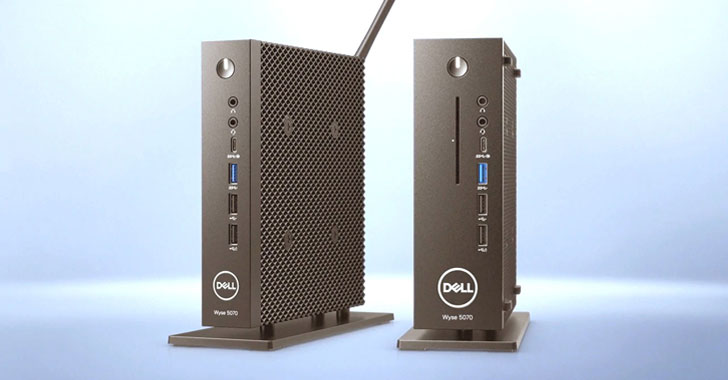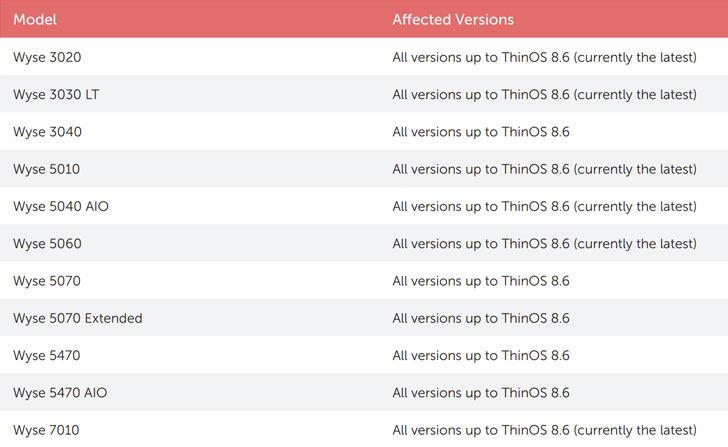
Two Critical Flaws — CVSS Score 10 — Affect Dell Wyse Thin Client Devices
10 High
CVSS3
Attack Vector
NETWORK
Attack Complexity
LOW
Privileges Required
NONE
User Interaction
NONE
Scope
CHANGED
Confidentiality Impact
HIGH
Integrity Impact
HIGH
Availability Impact
NONE
CVSS:3.1/AV:N/AC:L/PR:N/UI:N/S:C/C:H/I:H/A:N
6.4 Medium
CVSS2
Access Vector
NETWORK
Access Complexity
LOW
Authentication
NONE
Confidentiality Impact
PARTIAL
Integrity Impact
PARTIAL
Availability Impact
NONE
AV:N/AC:L/Au:N/C:P/I:P/A:N
A team of researchers today unveiled two critical security vulnerabilities in Dell Wyse Thin clients that could have potentially allowed attackers to remotely execute malicious code and access arbitrary files on affected devices.
The flaws, which were uncovered by healthcare cybersecurity provider CyberMDX and reported to Dell in June 2020, affects all devices running ThinOS versions 8.6 and below.
Dell has addressed both the vulnerabilities in an update released today. The flaws also have a CVSS score of 10 out of 10, making them critical in severity.
Thin clients are typically computers that run from resources stored on a central server instead of a localized hard drive. They work by establishing a remote connection to the server, which takes care of launching and running applications and storing relevant data.
Tracked as CVE-2020-29491 andCVE-2020-29492, the security shortcomings in Wyse’s thin clients stem from the fact that the FTP sessions used to pull firmware updates and configurations from a local server are unprotected sans any authentication (“anonymous”), thus making it possible for an attacker in the same network to read and alter their configurations.
The first flaw, CVE-2020-29491, enables the user to access the server and read configurations (.ini files) belonging to other clients.
A second consequence of having no FTP credentials is that anyone on the network can access the FTP server and directly alter the .ini files holding the configuration for other thin client devices (CVE-2020-29492).
Most devastatingly, the configuration may include sensitive data, including potential passwords and account information that could be used to compromise the device.
Given the relative ease of exploitation of these flaws, it’s recommended that the patches are applied as soon as possible to remediate the risk.
CyberMDX also recommends updating compatible clients to ThinOS 9, which removes the INI file management feature. In the event an upgrade is not feasible, it’s advised to disable the use of FTP for fetching the vulnerable files and instead rely on an HTTPS server or Wyse Management Suite.
“Reading or altering those parameters [in the .ini files] opens the door to a variety of attack scenarios,” CyberMDX researchers said. “Configuring and enabling VNC for full remote control, leaking remote desktop credentials, and manipulating DNS results are some of the scenarios to be aware of.”
Found this article interesting? Follow THN on Facebook, Twitter and LinkedIn to read more exclusive content we post.
10 High
CVSS3
Attack Vector
NETWORK
Attack Complexity
LOW
Privileges Required
NONE
User Interaction
NONE
Scope
CHANGED
Confidentiality Impact
HIGH
Integrity Impact
HIGH
Availability Impact
NONE
CVSS:3.1/AV:N/AC:L/PR:N/UI:N/S:C/C:H/I:H/A:N
6.4 Medium
CVSS2
Access Vector
NETWORK
Access Complexity
LOW
Authentication
NONE
Confidentiality Impact
PARTIAL
Integrity Impact
PARTIAL
Availability Impact
NONE
AV:N/AC:L/Au:N/C:P/I:P/A:N

